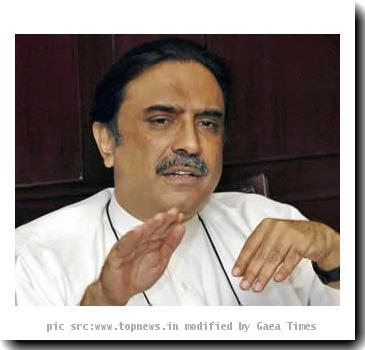Floods surging into southern Pakistan test city defenses; president defends response
By Chris Brummitt, APMonday, August 23, 2010
Pakistani president defends gov’t flood response
SHADAD KOT, Pakistan — Pakistan’s president defended the government’s much-criticized response to the country’s record-breaking flood crisis as emergency workers worked frantically to shore up a system of levees protecting two southern cities.
The floods, which began nearly a month ago with hammering rains in the country’s northwest, have affected more than 17 million people, a U.N. official said, warning that the crisis was outstripping relief efforts. About 1,500 people have died in the floods, most in the first few days, though the crisis continues to grow.
President Asif Ali Zardari said that anger at the government in the coming months is inevitable given the scale of the disaster, comparing it to the anti-government sentiment generated by the aftermath of Hurricane Katrina in the United States.
“There will be discontent, there is no way any nation, even a superpower …. can bring the same level of satisfaction that will be close to the expectations of the people,” Zardari said in an interview Monday with a small group of foreign reporters in the capital, Islamabad. “Surely we will try and meet them as much as we can.”
Still, he defended his handling of the crisis and said the government “had functioned to its fullest capacity.”
The widespread misery of the floods has triggered speculation of social unrest, food riots or even a challenge to the government’s rule before its term ends in 2013.
The floods have so far destroyed or damaged 1.2 million homes and affected 17.2 million people, U.N. spokesman Maurizio Giuliano said.
“The floods are outrunning our relief efforts. We move faster and faster, but the finish line keeps moving further ahead,” Giuliano said.
In Shadad Kot, in the southern province of Sindh, authorities are increasingly worried that even the 10 miles (18 kilometers) of new levees soldiers have built may not hold back floods in the city, and Qambar city further to the south.
Workers piled stones and sandbags to plug leaks in the levees, trying to stay ahead of any damage to the defenses.
“It is the last-ditch effort to save the city,” said Brig Khawar Baig. “We are trying to block the water here. If it crosses over, we fear it will go further south and inundate more towns.”
Ninety percent of Shadad Kot’s 350,000 residents have already fled the city. Many have also left Qambar and other nearby towns.
On the eastern side of the city, levees were under pressure from 9-foot (2.7-meter) -high floodwaters, said Yaseen Shar, the top administrative official.
Zardari has been criticized for traveling to Europe on a 10-day trip just as the crisis was unfolding. The anger against the already unpopular president among some sections of the media has left him looking more politically isolated than ever.
“I have my own reasons for being where I was at what times,” he said, saying his meetings with the leaders of France and Great Britain were essential.
Zardari’s party has a solid majority and there is no constitutional mechanism to get rid of him before elections. Historically the army in Pakistan has stepped in to end civilian rule, but analysts agree the current crop of generals do not want to enter into politics.
Asked whether there may be political consequences from the floods, Zardari said: “Anybody can lose the coming election and some other political force can win,” he said, adding that he still thought his Pakistan’s Peoples Party would emerge victorious.
The floodwaters have devastated lives from the mountainous north to the southern plains, and they are expected to begin draining into the Arabian Sea in the coming days.
Since the floods swept the country more than three weeks ago, the Taliban and al-Qaida have been relatively quiet. But on Monday, three bomb attacks rocked the northwest, one of which killed the head of an anti-Taliban militia on the outskirts of the main city of Peshawar.
Hundreds of people who fled the deluge blocked a highway near the town of Kot Adu in Punjab province to protest the slow pace of aid deliveries.
“No food came here for the last two days … We can wait — children can’t,” said Mohammad Iqbal, one of about 400 protesters.
Local charities, the Pakistani army and international agencies are providing food, water, medicine and shelter to the displaced, but millions have received little or no help. Aid officials warn that waterborne diseases such as cholera now pose a threat.
On Sunday, the government said the world has given or pledged more than $800 million of aid.
Associated Press writers Khalid Tanveer in Muzaffargarh, Aaron Favila in Kot Adu and Tim Sullivan in Sukkur contributed to this report.
Tags: Asia, Asif Ali Zardari, Emergency Management, Floods, Municipal Governments, Pakistan, Shadad Kot, South Asia

